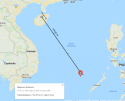Deino, please tell me you're not starting with the falmpalm photos as well...
Promised ... I'll stop ... but sometimes even me - especially in times of great tense - is loosing my patience!
Deino, please tell me you're not starting with the falmpalm photos as well...
If the Chinese consider these islands to be of very high strategic value, then they should protect them well. Some people would recommend further land reclamation, but due to global warming, higher water levels need to be taken into consideration.If you're talking about long-term habitation over the decades/centuries, Taiping Island is a better option for an inhabited island in the SCS.
Yes, a South China Seas version of the Xinjiang BingTuan would make sense.
But I think it should be on a much smaller scale, and the reclaimed SCS islands are best limited to aquaculture, agriculture, tourism and helping the islands become more self-sufficient.
Plus the SCS islands have strategic value as they help the Chinese military protect the sea lanes carrying China's trade.
If the Chinese consider these islands to be of very high strategic value, then they should protect them well. Some people would recommend further land reclamation, but due to global warming, higher water levels need to be taken into consideration.


The scientists believe land reclamation has sped up the process.
Five years ago, China sent in dredgers and cranes to build on the reef. They dredged up sand from the shallow lagoon and pumped it into the coral reef to create an artificial island 5 metres (16 feet) above sea level.
“This process is very similar to the formation of natural coral islands, which mainly depends on storm or tidal waves to move and carry coral debris to form the island,” Xu said in the paper. “[Land reclamation has] accelerated this process.”
The researchers found that the level of fresh water changed with extreme weather such as typhoons, which brought salt water flooding onto the island. But according to their computer modelling, the freshwater body on Fiery Cross Reef could become stable in as little as 15 years.
It would be important not just for humans on the island, but also its ecosystem, with many plants and animals depending on fresh groundwater to survive and thrive.
At present, people on China’s man-made islands rely on desalination, and there is a shortage of fresh water, according to official newspaper Science and Technology Daily.
Lu Chunhui, a professor of hydrogeology at Hohai University in Nanjing who was not involved in the study, said the freshwater lens could be fragile – and if it was tapped too early it could cause seawater to contaminate the reservoir.
He said it was possible to estimate how much fresh water could be extracted without damaging the resource, but it would require a wide range of data such as weather records and geological surveys.
Marine engineers have proposed ways to stop seawater intrusion on the island, including by building a wall. “Such technology works not only on remote islands but in coastal cities with water problems such as Singapore and Hong Kong,” Lu said.




To be honest, whatever Confucius actually said make more sense in Classical Chinese (文言文) than any English translation.Hullopilllw: Learn from Confucius (551-479) “Those who gather for small talk all day Long without speaking what is right or true, but only display their petty cleverness will not accomplish anything”.
